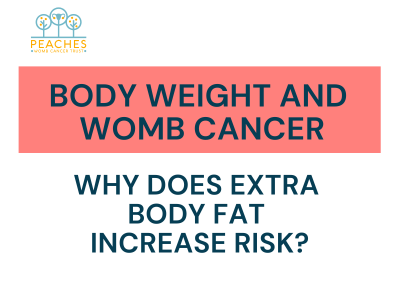September is Gynaecological Cancer Awareness Month — a time to raise awareness of cancers that affect the reproductive system and to share information that could help save lives. At Peaches, we’re committed to helping everyone understand their risk of womb cancer in a clear, supportive, and respectful way.
Research shows that carrying extra body fat — which often leads to a higher body weight — can increase the risk of developing womb cancer. This isn’t always widely understood, and it’s not about appearance or size — it’s about how extra body fat can affect hormone levels and other processes in the body.
What is BMI?
BMI (body mass index) is a way to estimate body fat based on height and weight. While it’s not a perfect measure, it’s often used to help understand health risks. It can indicate when people may be carrying more body fat than is healthy for them.
Having extra body fat is one of the most significant known risk factors for womb cancer. This is mainly because it can influence hormone activity and cause ongoing low-level inflammation — both of which can affect the cells in the lining of the womb.
Oestrogen and the womb
One of the main ways body fat affects womb cancer risk is through oestrogen, a hormone that plays a key role in the reproductive system.
After menopause, when the ovaries stop producing oestrogen, the body still makes some — mostly through fat tissue. The more fat tissue there is, the more oestrogen is produced, leading to consistently higher levels in the body.
Excess oestrogen can cause the lining of the womb to grow too much. Over time, this can increase the chance of abnormal cell growth, which may develop into womb cancer.
While much of the focus is on how oestrogen levels rise after menopause due to fat tissue, it’s important to understand that excessive oestrogen can also affect pre-menopausal women.
In this group, the ovaries are still actively producing oestrogen, but excess body fat can lead to even higher overall levels. This hormonal imbalance — often called “oestrogen dominance” — may disrupt the regular menstrual cycle and contribute to conditions like polycystic ovary syndrome (PCOS) or endometrial hyperplasia, which can increase the risk of womb cancer over time. For pre-menopausal women, maintaining a healthy balance of hormones is just as crucial for protecting womb health.
How inflammation and insulin affect risk
Carrying extra body fat can also lead to ongoing low-level inflammation throughout the body. This mild, long-lasting inflammation may make it easier for damaged cells to grow and divide — a process that can sometimes lead to cancer.
Excess body fat can also disrupt the way the body processes insulin — a hormone that helps regulate blood sugar levels. When the body becomes less responsive to insulin (a condition known as insulin resistance), it compensates by producing more. Elevated insulin levels can interfere with the normal balance of reproductive hormones, potentially increasing oestrogen levels and lowering levels of progesterone, which plays a protective role in the womb lining. This imbalance may contribute to irregular periods, ovulatory issues, and thickening of the endometrial lining — all of which may raise the long-term risk of womb abnormalities and, eventually, cancer. Managing insulin levels through lifestyle changes can support overall hormonal health and reduce risk.
A complex picture
Cancer is rarely caused by a single factor. Genetics, age, lifestyle, and other health conditions all play a role. Having a higher body weight doesn’t mean someone will develop womb cancer, just as having a lower body weight doesn’t guarantee protection.
This information isn’t about blame — it’s about awareness. The more we understand how our bodies work, the more empowered we are to make choices that support our health.
Even small steps — such as moving more, eating well, getting enough rest, or seeking support — can help reduce risk over time and benefit overall wellbeing.
You’re not alone
If you have questions about your risk or just want to talk to someone who understands, we’re here to help. Reach out to us anytime at [email protected]. We offer support, advice, and information in a safe and understanding space.


